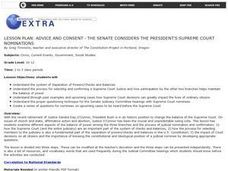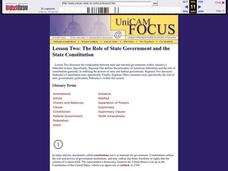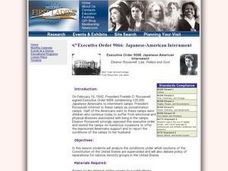Curated OER
The Power of an MP versus Their Loyalties to the Cabinet and Caucus
High schoolers analyze the benefits and drawbacks that the government MP faces belonging to a party caucus and their association with a powerful executive in the cabinet.
Curated OER
Advice And Consent - the Senate Considers the President's Supreme Court Nominations
Students study the process and questioning for selecting a Supreme Court Justice. They examine how the decisions of the Supreme Court effect the lives of citizens. They complete worksheets as they study the material.
Curated OER
Branches of Government Worksheet
This is a basic multiple choice activity. Learners answer a set of 9 multiple choice questions about early colonists and branches of government. You might use this as a check for understanding or a quick quiz. The first 2 questions are...
Reading Through History
The Federalist Papers: Federalist Paper No. 51
How did Federalists feel about the federal government? Learners search for the answers in the Federalist Paper No. 51, which discusses the powers of the presidency. Then, they answer various questions to test for their comprehension of...
Reading Through History
Anti-Federalist Paper No. 47
The path to a more perfect union was rockier than most history books would lead you to believe. Young historians read “Antifederalist No. 47,” written by James Madison (under the pen name “Centinel”), which sharply criticizes the...
USA.gov
Three Branches of Government
Here is a very simple handout that illustrates how the Constitution provides for a separation of powers between the legislative, executive, and judicial branches.
Curated OER
The Constitution
Students use both electronic and traditional resources to research information about U.S. Constitution, answer questions pertaining to Congress and the Presidency, and design HyperStudio presentation to display answers to research...
Curated OER
Government Lesson Plan: Lesson Plan 7
Students examine the impact of Franklin Roosevelt's executive order on Japanese-Americans. They discuss Presidential executive orders, read a handout, answer discussion questions, and write a letter to President Roosevelt.
Curated OER
Gulf of Tonkin Resolution
Students analyze the Gulf of Tonkin Resolution. They read the background to the Vietnam War and the social, political, and miliary issues surrounding the War and how they affected President Lyndon B. Johnson's Great Society Program. ...
Curated OER
Faulty Powers?
Students explore the White House response to Richard A. Clarke's testimony and apology to the commission investigating the events of September 11, 2001.
Curated OER
Whitman and Lincoln
Students determine if Lincoln and Whitman ever met and write a dialogue between the two men. In this Whitman and Lincoln lesson, students read Whitman's poem "Beat! Beat! Drums!" and connect it to the events of Lincoln's presidency....
Heritage Foundation
The Senate
Do your learners struggle to understand the differences between the Senate and the House of Representatives? Help them develop an understanding of how the US Constitution's clauses affect the Senate's operations. A high-quality...
Curated OER
The American Revolution: 1775 - 1783
Track the ins and outs and wartime strategies used by both the British and the Americans during the Revolutionary War. Multiple comparisons are made between both factions, maps, statistical data, images, and light text is used throughout...
Curated OER
The Role of State Government and the State Constitution
Pupils investigate the relationship between state and national governments. They define the principles of American federalism how the constitution outlines the powers of state and federal government. Lesson focuses on Nebraska specifically.
Curated OER
Citizenship Worksheet 3 - How the Government Works
In this government and citizenship worksheet, students learn the duties and responsibilities of the three branches of government and the system of checks and balances.
Curated OER
The 1828 Campaign of Andrew Jackson: Issues in the Election of 1828 and Beyond
Students research the campaign and election issues of Andrew Jackson. In this presidential election lesson, students research the campaign of 1828. Students then list the important issues. Students discuss the political advertisements in...
Curated OER
Thomas Jefferson
In this online interactive history worksheet, students respond to 10 short answer and essay questions about the accomplishments of Thomas Jefferson . Students may check some of their answers on the interactive...
Curated OER
Scooting Away from Justice?
Learners examine President Bush's July 2007, decision to commute the 30-month sentence of former White House official, I. Lewis 'Scooter' Libby by reading a New York Times article. They scan editorial sources on various sides of the...
Curated OER
Keeping an Appointment
Students studey about Bernard B. Kerik's decision to withdraw his nomination as homeland security secretary by President Bush. They hold a mock vetting process for other potential nominees for this position.
National First Ladies' Library
Executive Order 9066: Japanese-American Internment
Students analyze conditions under which sections of United States Constitution are superceded, research history of Native Americans, African Americans, and Japanese Americans, and debate policy of reparations for various minority groups...
K12 Reader
Branches of Government
Set down the basics of the three branches of government with the reading passage included here. After reading, class members answer five questions related to the passage.
Curated OER
Lincoln's Spot Resolutions
Students take a closer look at historical relations between the United States and Mexico. In this Texas annexation lesson, students examine primary documents authored by Zachary Taylor, James Polk, and Abraham Lincoln to consider why the...
Judicial Learning Center
About Federal Judges
Not just anybody can do the job of a federal judge, but according to the United States Constitution just about anybody can be appointed. The lesson outlines the process and requirements for becoming a federal judge, focusing on the...
National Endowment for the Humanities
The 1828 Campaign of Andrew Jackson: Changes in Voting Participation
Students give examples to indicate how voting participation changed in the first half of the 19th century, and make connections between changes in voting participation and the results of the election of 1828.

























